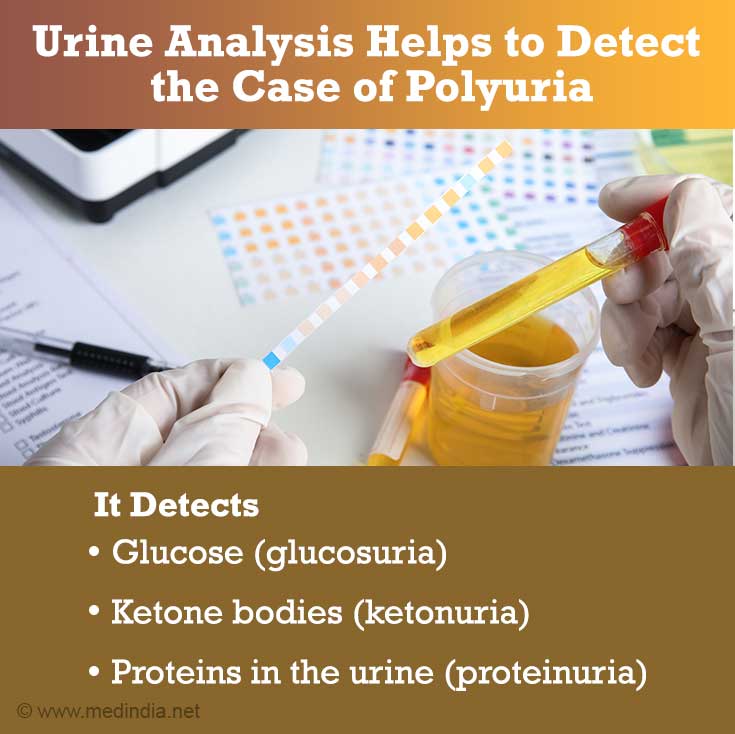- Algorithmic approach for the diagnosis of polyuria - (http://www.apiindia.org/medicine_update_2013/chap69.pdf)
- Polyuria – frequent urination - (http://www.diabetes.co.uk/symptoms/polyuria.html)
- Polyuria and polydipsia. Problems associated with patient evaluation - (https://www.ncbi.nlm.nih.gov/pubmed/2134078)
- Urination - excessive amount - (https://medlineplus.gov/ency/article/003146.htm)
- Polyuria in chronic kidney disease is related to natriuresis rather than to water diuresis - (https://www.ncbi.nlm.nih.gov/pubmed/?term=Polynocturia+in+chronic+kidney
+disease+is+related+to+natriuresis+rather+than+to+water+diuresis)
What is Polyuria?
Polyuria is the passage of abnormally large volumes of urine, which equates to about 2.5-3 liters of urine per day or urine output more than 40 ml/kg/day.
Polyuria is often accompanied by increased frequency of urination, but the two conditions are not always associated since the underlying cause is usually different.
What are the Causes of Polyuria?
There are five major causes of polyuria. These can be (i) Renal, (ii) Endocrine, (iii) Iatrogenic, (iv) Metabolic, or (v) Psychological.
Renal
- Nephrogenic Diabetes Insipidus: This occurs when the kidneys are unable to respond to anti-diuretic hormone (ADH), whose function is to conserve water by reducing urine excretion resulting in polyuria. The kidney's ability to respond to ADH can be impaired by chronic disorders including polycystic kidney disease, sickle cell disease, kidney failure, partial blockage of the ureters, and inherited genetic disorders.
- Fanconi's Syndrome: This syndrome is named after Guido Fanconi, a Swiss pediatrician who first described the syndrome. Here, the malfunctioning kidney fails to reabsorb certain biomolecules (glucose, amino acids) and ions (bicarbonate, phosphorus, potassium), thereby causing polyuria.
- Chronic Pyelonephritis: Pyelonephritis is the inflammation of the kidneys due to bacterial infection. Chronic infections can lead to scarring and impaired kidney function, which can result in polyuria.
- Chronic Kidney Disease (CKD): This condition causes gradual deterioration of kidney function, which results in nocturnal polyuria, primarily due to excretion of sodium ions (natriuresis) causing osmotic diuresis.
Endocrine
- Diabetes Mellitus: Uncontrolled diabetes mellitus can cause polyuria due to osmotic diuresis.
- Central Diabetes Insipidus: Diabetes insipidus manifests as excessive excretion of water in the urine. In central diabetes insipidus, polyuria can occur due to trauma, injury, tumors, and lesions of the brain.
- Cushing's Syndrome: Increased urination is a symptom of
Cushing's syndrome which can arise due to pituitary gland tumor (pituitary adenoma) and ectopic adrenocorticotropic hormone (ACTH)-secreting tumor.
Iatrogenic
- Diuretics: Polyuria can occur due to recent initiation of diuretics for excreting excess water in the body e.g. in heart failure or peripheral edema.
- Alcohol: Drinking too much alcohol can cause polyuria.
- Lithium: A patient having a history of lithium use for treating bipolar disorder can exhibit polyuria.
- Tetracycline: Polyuria is a potential adverse side-effect of antibiotics like tetracycline.
Metabolic
- Hypercalcemia: This is the increase in blood levels of calcium. This can occur due to calcium supplementation during osteoporosis, bone cancer, or hyperparathyroidism.
- Hypokalemia: In this condition, the blood concentration of potassium falls. This can occur due to chronic diarrhea, diuretic use, and primary hyperaldosteronism.
Psychological
- Polyuria can occur due to excessive compulsive drinking of water, technically known as psychogenic polydipsia. This can be due to anxiety or a history of psychiatric illness.
- Polyuria can occur due to complications of psychotic illness.

What are the Symptoms of Polyuria?
The most common symptom of polyuria is excessive urination at regular intervals throughout the day and night. It is usually associated with excessive thirst (polydipsia) and increased urination at night (nocturia). Other symptoms depending on the etiology include the following:
- Weight Loss: Rapid weight loss is indicative of Type I diabetes. It is also a feature of CKD and may also occur due to dehydration arising from diabetes insipidus.
- Malaise: Polyuria can cause severe dehydration, leading to malaise and fatigue.
- Headache: Pituitary tumors can give rise to severe headaches due to increased pressure in the brain, technically termed intracranial pressure.
- Visual Disturbances: Raised intracranial pressure due to a brain tumor can cause swelling of the optic disc of the eye, termed papilledema. A pituitary tumor can also lead to visual field defects.
- Blood Pressure Fluctuations: Polyuria causes dehydration, which can lead to increased heart rate (tachycardia) or decrease in blood pressure due to posture (postural hypotension). Increased intracranial pressure can cause increased blood pressure, accompanied by decreased heart rate (bradycardia).

How do you Diagnose Polyuria?
Diagnosis will be a step-by-step process, which is likely to be divided into the following stages:
- Medical History
- Physical Examination
- Laboratory Investigations
Medical History
At the outset, the doctor will take a thorough medical history of the patient. Information regarding volume of fluid consumed and voided will be sought to help distinguish between polyuria and urinary frequency. Questions such as age of onset, rate of onset (abrupt vs. gradual), presence of any clinical factors that may precipitate polyuria will be asked by the doctor. Information about pre-disposing factors such as diabetes mellitus, psychiatric disorders, sickle cell disease, and hyperparathyroidism will also be asked.
Physical Examination
Next, a thorough physical examination will be carried out. This will help to eliminate other possible causes for the symptoms being displayed by the patient, thereby narrowing-down the differential diagnosis.
Laboratory Investigations
There are two types of laboratory investigations for polyuria. These include urine tests and blood tests. If necessary, other specialized investigations may also be ordered.
Urine Tests
- Urinalysis: Urine analysis is carried out to identify any abnormal substances that may be present. For example, the presence of glucose (glucosuria) and ketone bodies (ketonuria) in urine occur in diabetes mellitus. Similarly, presence of proteins in the urine (proteinuria) is indicative of kidney disease. Physicochemical measurements such as the specific gravity of urine can also indicate the presence of certain diseases. For example, lowered specific gravity is indicative of diabetes insipidus and psychogenic polydipsia.

- Assessment of Osmolality: Osmolality is the concentration of a solution expressed as the total number of solute particles per kilogram. The normal 24-hour urine osmolality is, on average, 500-800 mOsm/kg of water. Usually, an early morning urine sample is taken and analyzed for osmolality in conjunction with the plasma osmolality. An abnormally low urine osmolality occurs in diabetes insipidus. The corresponding plasma osmolality is very high. In psychogenic polydipsia, both the urine and plasma osmolality are decreased.
- Assessment of Proteinuria: Proteins are essential for the body. So, these are normally not excreted in the urine. However, in kidney disease, proteins sometimes pass out in the urine. To assess the kidney function, urine is collected over 24-hours and the albumin-creatinine ratio (ACR) is determined to see if microalbuminuria is occurring. Presence of microalbuminuria is indicative of a malfunctioning kidney.
Blood Tests
- Fasting Blood Glucose: The fasting blood glucose (FBG) is measured to see if diabetes mellitus is present. Uncontrolled diabetes is a common cause of polyuria.
- Measurement of Serum Electrolytes: Abnormalities in the levels of the serum electrolytes calcium and potassium are indicative of CKD. Elevation of serum sodium (hypernatremia) occurs in central or nephrogenic diabetes insipidus. On the other hand, decrease in the levels of serum sodium (hyponatremia) is indicative of polydipsia.
- Measurement of Drugs: Drugs like lithium can be measured in patients having bipolar disorder. Elevated blood lithium levels can be a cause of polyuria in these patients.
- Complete Blood Count: A complete blood count (CBC) is a blood test that evaluates the overall health and detects a wide range of disorders, including anemia, infections etc. For example, in anemia, the hemoglobin level drops appreciably. Presence of anemia in the context of polyuria might be indicative of CKD or collagen vascular diseases.
- Erythrocyte Sedimentation Rate: The erythrocyte sedimentation rate (ESR) is the rate at which red blood cells (RBC) sediment in a period of one hour. It is a common blood test, and is a non-specific measure of inflammation. In the context of polyuria, the ESR is raised in collagen vascular diseases and myeloma.
Specialized Investigations
Specialized investigations may be ordered in the context of positive reports of urine or blood tests. These are usually carried out in the hospital setting at secondary or tertiary health centers.
- Diagnostic Imaging: X-ray, ultrasonography (USG) and computed tomography (CT) scans of the abdomen may be carried out to assess the condition of the kidneys and urinary tract. X-rays, CT scans and magnetic resonance imaging (MRI) of the brain may be ordered if brain abnormalities are suspected. These investigations help to identify pituitary tumors as well as other brain tumors. Calcification may be observed in case of craniopharyngiomas.
- Water Deprivation Test: This test helps to distinguish between central and nephrogenic diabetes insipidus. Briefly, in the early morning the patient's weight is taken and venous blood is collected to estimate serum electrolytes and osmolality. Urine osmolality is also measured. The urine that is passed is collected hourly and its osmolality is measured. Thus, the patient is progressively deprived of water, leading to dehydration. This continues till postural hypotension accompanied by tachycardia occurs, or Normalof the body weight is lost, or the urine concentration stabilizes at ~30 mOsm/kg in two consecutive samples. Then 5 units of aqueous vasopressin in injected subcutaneously. Urine is collected after 1 hour, marking the end of the test. Normally, the urinary osmolality does not increase above 5% following vasopressin injection. However, in nephrogenic diabetes insipidus, the osmolality can increase up to 45%, while in central diabetes insipidus, it can increase up to 100%. These observations help to distinguish between the two types of diabetes insipidus.
How do you Treat Polyuria?
The treatment varies with the type of cause (etiology) involved in precipitating polyuria in the first place. In case of severe dehydration, hospitalization is required to correct the fluid and electrolyte imbalance. Subsequent treatment is dependent on the test reports and any confirmed cause of polyuria identified.
How do you Prevent Polyuria?
Polyuria is difficult to prevent, particularly if it is renal or endocrinal in origin. However, the symptoms can be eased by regulating fluid intake, avoiding caffeine and alcohol, avoiding fluids at bedtime, taking diuretics strictly under medical supervision, controlling diabetes mellitus, and finding alternatives to lithium in case of a psychogenic cause.

Health Tips
Regulate your fluid intake: You should be aware how much you're drinking daily. Regulating the fluid intake will help to ease the symptoms of polyuria.
Avoid fluids before bedtime: This will help to prevent nocturnal polyuria by decreasing the urge to urinate.
Limit caffeinated and alcoholic beverages: These types of beverages tend to cause polyuria and so consumption must be strictly regulated.
Be knowledgeable about the side-effects of medications: Since polyuria can be caused by certain medicines (iatrogenic), it is better to understand the side-effects of the medicines that you may be consuming.








